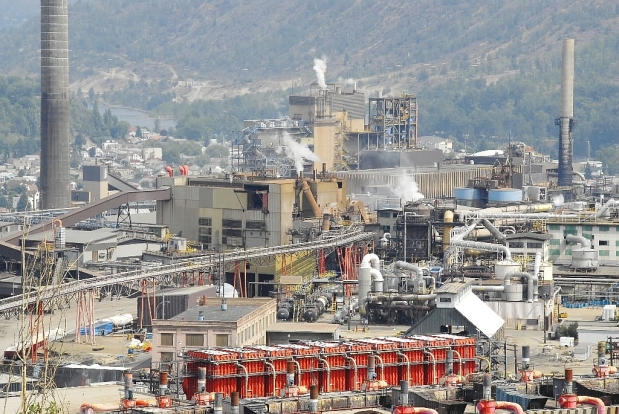forum
library
tutorial
contact

Mining Company Teck Admits Polluting U.S. Waters;
Damage to be Assessed
by Dene Moore
The Province, September 10, 2012
|
the film forum library tutorial contact |

|
Mining Company Teck Admits Polluting U.S. Waters;
by Dene Moore
|
Trail smelter admits discharge of toxic metals
 VANCOUVER - There used to be a beach in Washington state called Black Sand Beach.
VANCOUVER - There used to be a beach in Washington state called Black Sand Beach.
Only it wasn't sand that lined the banks of the Columbia River. It was slag, a pebbly waste laden with arsenic, mercury, lead and an alphabet soup of other metals left over from processing zinc at a smelter upstream, across the border in British Columbia.
The black sand has been hauled away, and on the eve of a lawsuit against smelter operator Teck Resources Ltd. for environmental damage caused by pollution from its plant in Trail, B.C., the Vancouver-based mining giant has admitted that effluent from the smelter has polluted the Columbia River in Washington state for more than a century.
Specifically, the company made a legal admission that: "Trail discharged solid effluent, or slag, and liquid effluent into the Columbia River that came to rest in Washington state, and from that material, hazardous materials under (U.S. environmental laws) were released into the environment," Dave Godlewski, vice-president of environment and public affairs for Teck American, said in a telephone interview.
The discharges date from 1896 to 1995.
"That's what we've agreed to. We've not talked about the amount of the release. We've not talked about the impacts of those releases. We've just agreed that there has been a release in the U.S.," Godlewski said.
For the state Department of Ecology, the admission is a major victory in what has been a long, drawn-out fight.
"It's very good news for us," said spokeswoman Jani Gilbert. "It means that everyone is accepting the science... and we're just closer in the process to getting some resolution of this."
When Teck American, the U.S. subsidiary of Teck Resources, cleaned up Black Sand Beach two years ago, they hauled away 9,100 tonnes of slag.
The lawsuit brought by the Colville Confederated Tribes claims that 145,000 tonnes has been dumped directly into the river, where it has flowed downstream and settled on the riverbed. Bottom-feeding aquatic species eat it and the metals begin their journey up the food chain.
"It changes the ecosystem," Gilbert said.
The lawsuit claims the metals have contaminated the surface water, ground waters and sediments of the upper Columbia River and Lake Roosevelt, the reservoir created by the Grand Coulee Dam. The 5,700-square-kilometre Colville reservation borders the Columbia River.
The cost of cleaning up the contamination has been pegged as high as $1 billion, and the state wants Teck to bear that cost.
Teck said the agreement will likely lead to a court judgment in favour of the plaintiffs, however, the court has yet to decide the extent of any injuries that may have resulted and what -- if any -- damages the company will have to pay.
In 2004, the EPA ordered Teck to conduct studies on the effects of heavy metals from the Trail smelter south of the border. Teck fought that order all the way to the U.S. Supreme Court, which refused to hear their case.
In the meantime, Teck entered a voluntary agreement with the EPA in 2006 to begin studies. Those assessments, which will determine the question of legal liability and damages, continue and are expected to be complete by 2015.
"It will assess what the real risk to human health and the environment is, and ultimately if that risk is unacceptable to the EPA... how will we mitigate those risks," Godlewski said.
Over the past few decades, Teck has invested more than a billion dollars into environmental improvements and in 1996 stopped dumping slag into the river. Just last year, the company said it would invest another $210 million to increase capacity of an electronic waste recycling operation at its zinc smelter and hydroelectric plant in Trail.
The company has argued that it alone cannot be held responsible for the environmental damage in the Columbia River, and on Monday said it "estimates that the compensable value of any damage will not be material."
Godlewski said studies have shown that water in the Upper Columbia River meets the quality standards in both Canada and the U.S., beaches are safe for recreational activities, and fish in the river are as safe or safer to eat than fish in other waterways in Washington state.
But the ghosts of the company's environmental past continue to haunt it today.
A study by Environment Canada a couple of years ago confirmed that groundwater had been tainted by metals that leached from old waste dumps from the 1950s to the 1980s. That groundwater was making its way into the Columbia River, and Environment Canada ordered a remediation plan.
Gilbert said the admission by Teck is precedent-setting, but the company said the major issue of the lawsuit -- whether or not the U.S. authorities have jurisdiction over a company operating fully in Canada in compliance with Canadian regulations in place at the time -- has not been resolved.
"I think the question really is a much broader one than just the Upper Columbia River and needs to be answered," he said.
"These sorts of questions are going to be more and more prevalent over time, as people measure wind-borne or aerial-borne pollution from China coming to the United States, the whole question of greenhouse gases... as well as water-borne contaminants crossing borders. It's a part of the law that has really not been explored that much."
learn more on topics covered in the film
see the video
read the script
learn the songs
discussion forum
